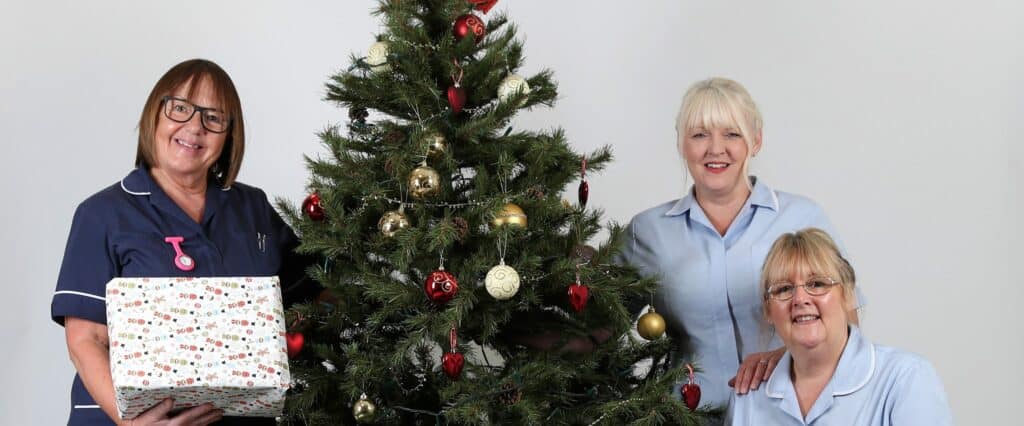Christmas! It’s a time for sharing gifts, eating one too many mince pies and celebrating with friends. But this festive season, some families, will need the care and support of Birmingham St Mary’s Hospice to help them or a loved one who is living with life-limiting illness.
Kate and Julie, who are part of our Hospice at Home team, will be providing compassionate care and emotional support over the Christmas period to people who are at the very end stages of their illness. Here, they talk about the care they provide in people’s own homes, how their support provides comfort to patients and their loved ones, and why they enjoy working Christmas Day…
Hi Kate and Julie! The festive season is nearly upon us but what’s it like to work on Christmas Day at the Hospice?
Julie: I love working on Christmas Day. Just because it’s Christmas, it doesn’t mean that people don’t need our support so I think it’s amazing that we are able to offer our services throughout the whole festive period. In fact, I think it’s a real privilege to be welcomed into people’s homes on what is usually, a very special and intimate day for families and loved ones.
Kate: I couldn’t agree more – it’s a completely different atmosphere working on Christmas Day compared to any other day. Like Julie said, just because it’s Christmas it doesn’t mean that people won’t need our support on the day. However, on the flip side of that, just because someone might be approaching the very end of life, it doesn’t mean they can’t be part of the Christmas celebrations. I’ve been into people’s homes on Christmas Day and you’ll still see all the decorations up, mum and dad cooking the turkey, grandchildren opening presents, families laughing and sharing stories. Some families are aware that this may be their last Christmas with their loved one, so they want to make sure it’s special for everyone. The fact that we can be a part of that, supporting a person who is at the very end of life to be able to experience the festivities at home and in comfort and peace, is really very humbling.
Julie: Of course, for some families, there is sadness and the celebrations may be a little tamer then usual but it’s a real honour that we are helping them to have that one last Christmas together at home. Spending Christmas in the comfort of your own home with loved ones is important to so many people, so it’s good to know that we are able to make that happen.
What do you do when you visit a person at home?
Julie: We mainly provide personal care. So that could involve bathing a patient, helping to manage any symptoms they might have such as a sore mouth, and just making sure that they are comfortable and pain-free. Our main aim is to ensure the person is supported at home because that’s where they’ve said they want to be. What many people don’t realise is that we’re also there to offer support to the family too. We’re there to listen to their concerns and answer any questions they might have. We know this is usually an incredibly distressing and upsetting time for family members, so we try to take away some of the confusion and fear that can come with a life-limiting diagnosis.
Kate: We also give people our time, which I think is so important when they’re going through this difficult period in their life. Our visits are never rushed – even on Christmas Day – and instead, we take the time to sit and get to know them, and understand their needs and wishes. We know it’s a real privilege to have that time and we know the difference it can make when they’re going through this distressing period. I think giving time reassures them that people do care and want to help.
Do families like you visiting them on Christmas Day?
Kate: Yes, I think they do because it can be a relief that we are there. It’s relief for the patient because they know that they can stay at home and get the care they need, and it’s relief for the family because they know their loved one is in good hands and is getting properly supported.
Julie: When we visit someone, I think we take away a lot of pressure, stress, fear and emotional strain for both the patient and their loved ones. For a lot of families, family members will take on the role of ‘carer’ when their loved one has been diagnosed with a life-limiting illness, which is often a new and scary role for many. But when we go into people’s homes, we try to encourage family members to be just that – a family member – so that they can spend time together as loved ones and not in the roles of ‘patient’ and ‘carer’. I think this is especially important on Christmas Day.
Kate: Absolutely. Christmas is a chance to spend quality time with loved ones. Working Christmas Day allows families to focus on the things that matter to them, which is usually spending quality time together.
Do you have any fond festive memories?
Kate: One year, we handed out donated Christmas hampers.
Julie: Oh yes! One year, some wonderful shops in Birmingham – such as John Lewis – donated beautiful festive hampers filled with food, drink and household goods. We took them out with us on Christmas Day and gave them to the people we are caring for and their reaction was really moving. I think a lot of people were really touched.
Kate: It felt lovely to hand them out and make Christmas feel that little more special. More often than not, people are so grateful to us because of all the care and support we provide but what they don’t realise is that we’re really grateful to them too, for allowing us to be part of their lives at this quite personal and pivotal moment. It’s a real honour to get to know someone and their loved ones and to be part of their journey.
What’s your favourite thing about working Christmas Day?
Kate: Being able to give families one last Christmas together is a real privilege.
Julie: So many of my friends say “oh, it must be hard working on Christmas Day” but the truth is, I love my job. I love being able to make other people’s Christmases special.
Thank you Kate and Julie for sharing what it’s like to work as a hospice nurse on Christmas Day.
This year, it will cost £24,658 to run our vital services on Christmas Day, including Hospice at Home, so we really do rely on the generous support of local people to make this happen. That’s why we’re asking you to join together and show you Care at Christmas. We have some wonderful festive fundraising ideas that you can do, so take a read, get involved and help care for more people who are living with life-limiting illness this festive season.



